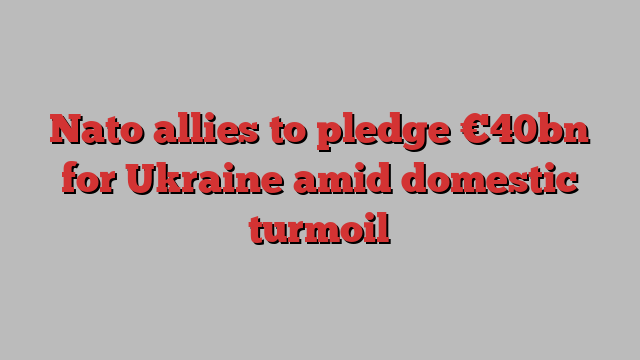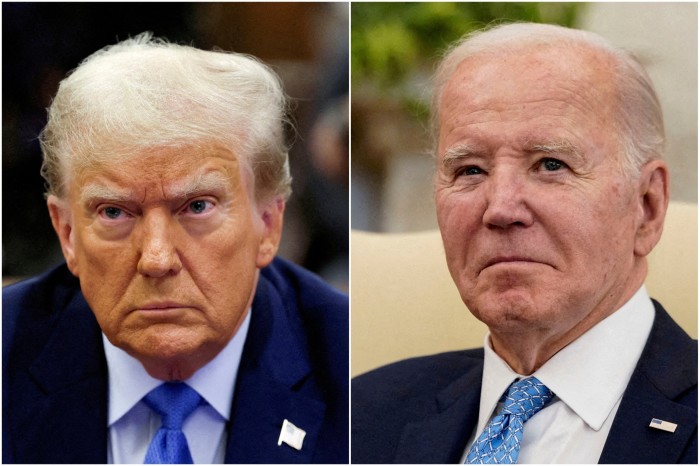
Nato leaders are expected to make a one-year, €40bn pledge of support for Ukraine this week, as the alliance’s most important members are engulfed in domestic political turmoil that limits their capacity to commit more long-term resources to Ukraine in its defence against Russia.
The summit starting on Tuesday in Washington comes on the heels of a snap election in France, where talks over a new government are expected to be complex and where the Ukraine-sceptic far right has become a major political force, and as Joe Biden faces pressure to quit the US presidential race against Donald Trump. In Germany, the coalition of Chancellor Olaf Scholz remains unpopular and fragile.
These tectonic shifts have undermined Nato’s efforts to cast the alliance’s 75th anniversary as a show of unwavering support for Ukrainian President Volodymyr Zelenskyy. Instead the event risks shining a light on the fragility of continued western aid for Kyiv.
“Of course, in democracies we can never provide guarantees. We don’t live in that world. But we live in a world of maximising good outcomes and minimising bad outcomes,” Jens Stoltenberg, secretary-general of Nato, said ahead of the summit.
He added that the collective €40bn pledge for Ukraine over the next year is an improvement on the current situation, in which individual contributions are not always transparent or costed using the same criteria. But it is less ambitious than Nato’s initial proposal for a multiyear $100bn support package.
“You can discuss whether the glass is full, but it is more than half full,” Stoletenberg told reporters.
Biden, meanwhile, hosts the summit facing growing calls to suspend his re-election campaign so another Democrat can run against Donald Trump in November.
Trump, who leads Biden in most national and swing state polls, has threatened to withdraw from Nato if elected to another four-year term. The former president has also repeatedly pledged to end military support for Ukraine.
Nato will not offer Ukraine a formal invitation to join the alliance, Kyiv’s most desired outcome. However, a senior Biden administration official said allies would make “significant” announcements of support for Ukraine, including “new steps” to bolster its air defences.
Biden is also set to host an event on Thursday with Zelenskyy and roughly two dozen allies that have signed bilateral security agreements with Kyiv.

Another point of concern is the need to increase defence budgets across Nato, so that all countries meet the 2 per cent of GDP spending target, while also sustaining support for Kyiv.
That will be a central priority for incoming secretary-general Mark Rutte, who replaces Stoltenberg on October 1, even as alliance diplomats warned it was becoming harder as taxpayers resist rising defence budgets.
Another challenge is managing pointed internal divisions, as illustrated by Hungarian Prime Minister Viktor Orbán’s controversial trip to Moscow last week to meet Russian President Vladimir Putin.
Orban, Nato’s most prominent critic of support to Kyiv, also leveraged his veto on Rutte’s appointment last month to secure an opt-out from Nato activities that support Ukraine.
The Biden administration official said the US was “concerned” by Orban’s trip, “which will neither advance the cause of peace nor will it promote Ukraine’s sovereignty, territorial integrity and independence”.
Stoltenberg said Nato had always managed to resolve its internal divisions since it was founded in 1949. “Again and again there are concerns, and again and again we prove to be resilient,” he said.
Even so, in the final negotiations on the summit communique, the US and Germany led efforts to resist including a reference to Ukraine’s path to Nato membership being “irreversible”, as demanded by many other allies, particularly in eastern Europe.
US and German scepticism over Ukraine’s membership is deep-seated. Officials cite the need for Kyiv to make major structural reforms, and that there is no possibility of formal progress on membership without an end to the war.
“Every time we have engaged the Ukrainians . . . we have been clear on the limitations, the need for reforms and the fact that part of their territory is under occupation,” said a senior US state department official.
Instead, Nato will offer Ukraine a support package that includes taking control of most co-ordination of military assistance to Kyiv, a role previously played by the US, and leadership of various national programmes to train Ukrainian troops in Poland.
The operation will not be formally called a Nato “mission” after Berlin, which is wary of anything that suggests Nato is a direct participant in the conflict, refused to endorse such terminology, seeing it as too militaristic.
On China, Nato allies are, meanwhile, expected to agree stronger language than previously to condemn Beijing for its economic support to Moscow in its war in Ukraine. That Chinese support includes increased supplies of technologies such as microchips and chemicals that have civilian purposes but are being used to manufacture Russian weapons.